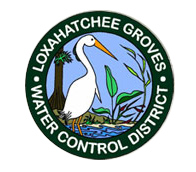The newly configured Loxahatchee Groves Water Control District Board of Supervisors reviewed the proposed $1.48 million budget for fiscal year 2016-17 on Monday, particularly $85,000 it expects to receive from the Town of Loxahatchee Groves, which has not yet approved payment for road maintenance the district performed.
Newly elected supervisors Anita Kane and Simon Fernandez took their seats alongside returning supervisors Laura Danowski, Frank Schiola and Don Widing following the annual landowners meeting.
LGWCD Administrator Steve Yohe said approval of the Truth in Millage (TRIM) statement is scheduled for the board’s regular meeting on Monday, July 11.
“At that time, we need to take some action to approve a resolution for adoption of a district budget and non-ad valorem assessment roll,” Yohe said, explaining that the district must report its TRIM rate on or before Friday, July 22. “We’re not going to ask for any approved resolution of the budget. The intent tonight was to have discussion.”
LGWCD Attorney Mary Viator said the district has until Sept. 12 to report the final tax rate.
“You have to adopt your TRIM rate, but you can adopt it higher and you can always reduce it,” Viator said. “You just can’t raise it after you adopt your preliminary TRIM rate.”
Schiola asked for clarification on the TRIM rate.
“So, if we find that there is a problem that was unexpected and we sent that initial TRIM rate in, we can’t raise it, we just have to bite the bullet?” he asked.
Yohe said a specific example is that the proposed budget shows $85,000 that the district anticipates to receive from the town from gas tax revenue, which has not yet been approved by the Loxahatchee Groves Town Council. It will not meet until July 19.
“They will not have an opportunity to approve the May 15 transmittal that we gave them requesting them to approve an interlocal agreement committing to provide that $85,000 to the district,” he said, recommending that when supervisors meet July 11, they increase the assessment rate by $10.80, to $160.80 per acre, which would equate to roughly $85,000, to assure that in the event that the town doesn’t give that revenue to the district, the budget is still viable.
If the town does approve giving the $85,000 to the district, as it has in the past, then the district can report a reduced final rate in September of $150, which is the current rate, he said.
Widing asked for a report before the July meeting on the impact to the district if it does not receive the gas tax money from the town.
“I want to know what the consequences would be for that,” Widing said. “This is a very critical decision for us.”
Kane said that she would also like to look at the need for maintenance equipment if the district turns over its remaining roads to the town.
“I’d like to look at what could be sold if we no longer have to maintain roads,” Kane said. “I presume we wouldn’t need graders and road waterers and things like that. That could cut down substantially on equipment costs and perhaps even personnel time.”
Schiola suggested that the new supervisors meet with Yohe before July 11 to go over the budget in detail.
Yohe added that because supervisors were having their June meeting so late due to the annual meeting, followed by the Fourth of July holiday, July 11 would arrive quickly.
Town Councilman Ron Jarriel said that the district’s road maintenance equipment is paid for, and the town’s road contractor, Bergeron, is doing an outstanding job. He would like to see the assessments remain the same.
“The one thing that I’m disappointed in is that we do not have an interlocal agreement with the water control district anymore for emergency-type situations,” Jarriel said. “The quick response of the district in short-term situations is a lot faster than anybody else. The town will work with you if you keep the roads. We seem to be having a hard time taking your roads, let alone you giving them to us. In the next month or so, I don’t think all that’s going to happen, so I would like to see the assessments stay the same. I would like to see the town work with you because you can justify the $85,000 in road money for the [road] mileage that you are still holding.”
Resident Ken Johnson said he thought that the LGWCD should get control of salary costs, particularly in working on Saturdays.
“I see graders and cutters and everything else up and down the road on weekends,” he said, adding that he understood that weekend work is justified following heavy rainstorms. “If you set aside X amount of hours for field workers to work on emergency situations and come up with a base crew… you’ll save that $85,000.”
Fernandez told Johnson that one of the reasons he sought election was to save money and look closely at expenditures.
“I’m saying this to assure you that one of the items that I will be working on with Mr. Yohe is precisely using the resources, how this has been handled with employees,” he said. “I like to think that all the employees are excellent employees. However, I have personally, and some people have personally, seen that workers listen to the radio; they’re dancing inside a piece of equipment. So that’s one of the items that we will address, and only the people who really care for this town will be able to stay in that department.”
In other business, auditor David Caplivski of Grau & Associates said the district had received an unmodified and clean opinion for the 2015 audit.
Caplivski recognized staff for their support during the audit. “They were very helpful and provided all the information that we requested,” he said. “An audit is a rigorous process, and we can be very demanding.”








